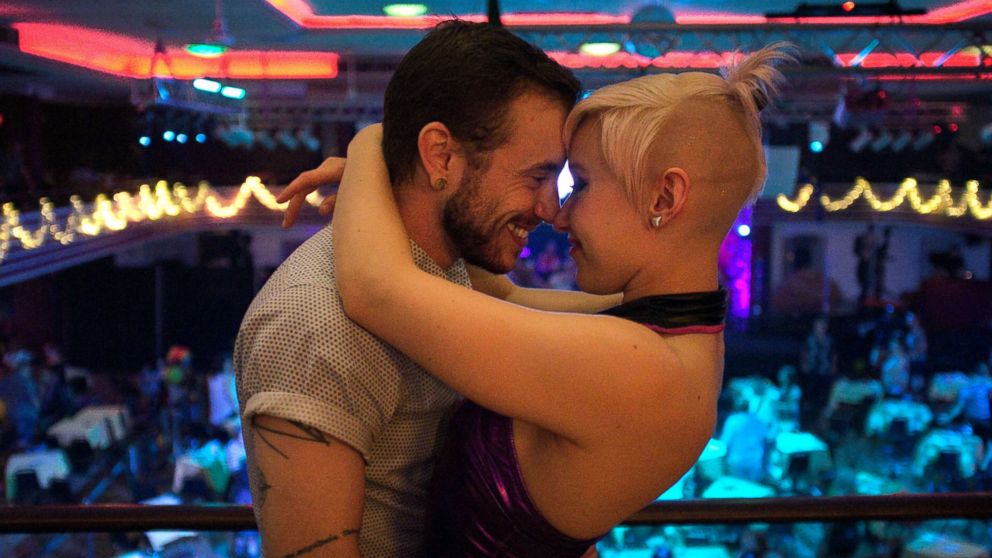
For Harrison Massie, transitioning from female to male was never about trading one gender for another.
Seven years ago, Harrison, now 29, started his journey “to feel more like myself.”
“I’m not embarrassed to say that I was ever a woman,” said Harrison, who lives in St. Louis, Missouri. “Ultimately it’s a part of who I am and how I was raised, and I love having the perspective of both genders.”
But Harrison said he longed to feel more comfortable in his own body and wanted to have certain masculine features, such as a flat chest.
As he embarked on his journey, Sara Swaty, a young photographer and friend, set off to capture it, frame by frame, year after year.
“In my previous work, I had never had the opportunity to connect with anyone so deeply and document their transition from the very beginning,” said Swaty, who first met Harrison as a teenager in high school.
“I always approached photo shoots with clear concepts and ideas of what I wanted the images to look like,” she said. “But with Harrison, I was … following his lead, and did my best to capture him as he felt, not as how I saw him.”
Rejection from family and relatives is common for many trans people, but that was not the case for Harrison, who always had the support of his loved ones.
In a 2016 study published in the journal LGBT Health, 31 percent of transgender individuals surveyed said they experienced a moderate amount of rejection from their families and 14 percent said they experienced a high amount of rejection.
A recent U.S. study found that roughly half of transgender male teens have attempted suicide at least once.
“Harrison’s been my soulmate, my companion,” said his father, Robbin, a retired teacher in his 60s. “He said he was transitioning and wanted to become a boy and I was fine with that.”
Harrison’s mother Stephanie said it was really hard at first to process her son’s decision to transition.
“It was like the death of that child.”
With time, though, she realized that he was still the same person and their relationship never wavered.
“He’s still the baby, still the light of the room.”
“I knew this was what he wanted to do and I knew it would make him so much happier, and it has so much,” said Harrison’s oldest sister Jasa. “I am very proud of him, and the man he has become.”
Harrison and his fiancée Sandra Manzoni, 29, a fellow bartender and an air acrobatics performer whom he met two years ago, have recently bought a house in St. Louis.
Harrison recounted how nervous he was when he first asked Manzoni out, telling a friend how he couldn’t breathe around her.
Now, a year after their engagement, “I’ve learned how to breathe with her in the house,” Harrison said jokingly.
Harrison’s tight-knit group of friends were hardly surprised by his decision to transition. They were taking cues from things he would say or do and, in a way, they saw it coming.
“When he came out as trans, we sort of looked at each other and went ‘Duh’,” said George Caputa, one of his closest friends who now lives in Germany.
“When you truly love and support one who is trans, their gender identity has little to do with what you love about them.”
As Harrison started his hormone therapy, the group met for the first months of injections, in celebration and to help him get comfortable with the process.
“Spending time with such a beautiful group of people and feeling the love they share with each other is incredibly uplifting,” said Swaty.
But Harrison also has faced many challenges.
“When I first started transitioning I couldn’t find a job for the life of me,” he recalled. “Anytime I tried to explain to an interviewer that my deadname (name prior to transition) wasn’t the name I went by, they just got confused and wouldn’t hire me.”
Eventually, Harrison found a home in craft bartending, through which he said he can express himself and finally be appreciated.
Healthcare was also among his biggest concerns. With patchy coverage, getting access to testosterone at an affordable price was often hard and he ended up paying for much of it out of pocket. He says he had to shell out roughly $110 every month for seven years, more than $9,000 in total.
Lack of health insurance remains a big concern for Harrison, who runs a bar in St. Louis, and a big hurdle to his getting top surgery, a procedure that includes the surgical removal of breasts and chest reconstruction that can cost several thousand dollars.
Encouraged by friends and eager to put an end to the physical pain caused by years of wearing a tight binder around his chest, Harrison recently started a “GoFundMe.com” page to raise enough money for his top surgery.
“I’ve always felt like surgery was always out of reach due to the price tag, which is why it’s taken me 7 years to ask,” he wrote on the web page. “So this is my current journey, please help me feel better, not only about my pain, but my self esteem.”
So far, Harrison has raised $8,330, surpassing his goal of $8,000.
Over these seven years, Harrison went from being the “pretty girl” in school to becoming his true self, growing a “beautiful red beard” and getting close to finally be able to swim in public.
“It’s beyond luck, karma, blessed, whatever you believe in,” he said. “I honestly never thought I would get to this point in my life.”
Story by Maria Caspani.





